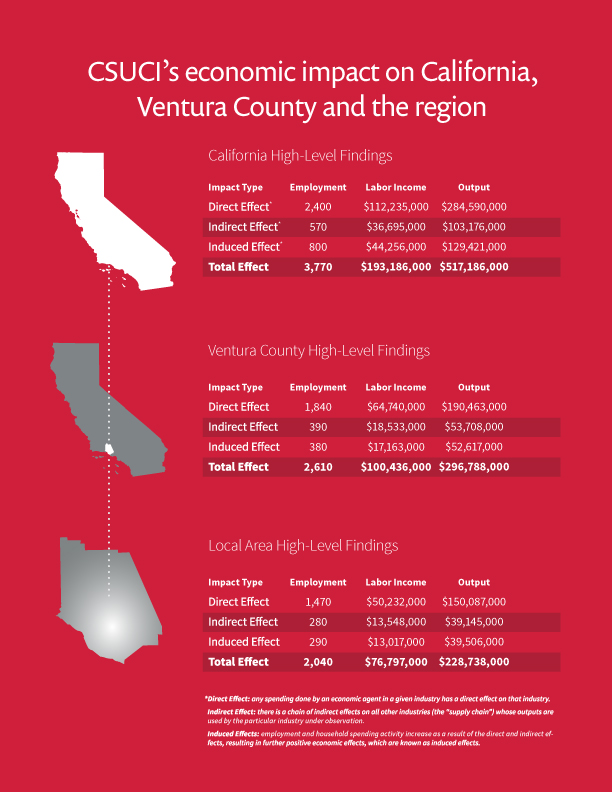By Zoe Lance
Any graduate of CSUCI knows the impact that the University made on their lives, whether it opened up a job opportunity, introduced lifelong friends or awakened a passion for learning.
While the University advances its mission to provide an exceptional educational experience, it is also making an economic impact on California, Ventura County and the region. The costs of running the campus have ripple effects through Camarillo and beyond, supporting California’s businesses and organizations along the way.
The CSU and campuses like CSUCI are a driving force behind
President Erika Beck
California’s economic development.
To better understand these effects, CSUCI embarked on a study in April 2017. The University partnered with SAGE Publishing, which sponsored the study, and Beacon Economics, a Los Angeles-based firm. The California State University had last conducted a systemwide study in 2004-05, and CSUCI wanted to share updated information.
“The CSU and campuses like CSUCI are a driving force behind California’s economic development,” said CSUCI President Erika Beck. “Higher education institutions perform these studies on a regular basis to understand and share the impact of how a university impacts its community, region and state, and CSUCI wanted to provide a deeper dive on the campus’ economic impact.”
The study’s findings were encouraging. In 2016-17, CSUCI generated $517.2 million in economic impact, of which $228.7 million was in Camarillo, Oxnard, Thousand Oaks and Ventura. Throughout the state, CSUCI supported nearly 3,800 jobs and generated $193.2 million in labor income.
Beacon Economics conducted the study using University-related financial data for the 2016-17 fiscal year, measuring CSUCI’s economic activity on the local, regional and state levels. The study incorporates the direct impact of the institution’s expenditures, as well as the indirect impact of supply chain-related spending.
They first looked at University expenditure data, or the goods and services CSUCI purchased to both keep the campus running and work on expansion. They also examined student spending — both out-of-pocket educational expenses and financial aid — as well as visitor spending at campus events, from campus preview days to Commencement.
 CSUCI made this impact through several other measures. The capital improvement projects
of 2016-17 were significant contributors, including work on Sierra Hall, the construction
of Santa Rosa Village student housing, and renovating Islands Cafe. It also received
over $4.6 million in faculty research awards, and advanced projects including the
Santa Rosa Island Research Station and the Student Research Conference sponsored by
SAGE Publishing.
CSUCI made this impact through several other measures. The capital improvement projects
of 2016-17 were significant contributors, including work on Sierra Hall, the construction
of Santa Rosa Village student housing, and renovating Islands Cafe. It also received
over $4.6 million in faculty research awards, and advanced projects including the
Santa Rosa Island Research Station and the Student Research Conference sponsored by
SAGE Publishing.
The study also explored how the University’s fiscal impact is tied to its social impact. The annual median earnings for an adult with a bachelor’s degree in Ventura County in 2016 was $61,900, compared to $31,400 for an adult with a high school diploma.
Ventura County was recently identified by 24/7 Wall St. as the 6th richest place in the US based on median household income, median home value, adults with bachelor’s degrees, and the area’s unemployment rate.
While the earning potential of a college graduate is substantial, so are the societal benefits — including co-curricular opportunities like participating in a community service project or an internship through the Henry L. “Hank” Lacayo Institute for Workforce & Community Studies — which instill a sense of civic engagement.
The University’s commitment to welcoming a student population that is reflective of Ventura County’s demographics also has long-term effects for the diversity of its community.
As CSUCI looks to the future, campus leaders are taking care to share the study’s findings as a proud reflection of the work students, faculty and staff have put into the University.
“The CSU provides the majority of the skilled professional workers that are critical to the state’s knowledge-based industries—industries like agriculture, engineering, business, technology, media and computer science,” Beck said. “Sharing this information helps everyone understand the value of the University and its impact to the communities we serve.”
Return to the Table of Contents
© Spring 2019 / Volume 23 /Number 01 / Bi-annual
